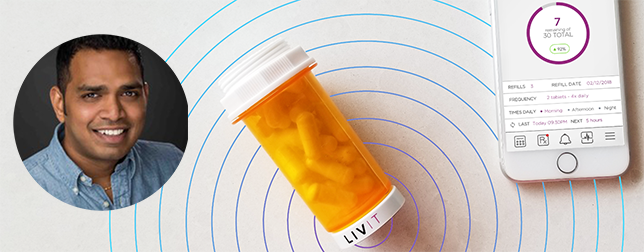Dharma Teja Nukarapu is the CEO & Founder of Shark Dreams. In an interview with WT | Wearable Technologies Mr. Nukarapu discussed his company’s ecosystem called LIVIT.
LIVIT ecosystem is designed to help patients and healthcare professionals with the problem of taking medications properly and timely. The system facilitates communication between patients, pharmacists and doctors by tracking medication consumption, increasing prescription adherence and compliance.
The LIVIT ecosystem consists of a medication monitoring device and a body vital monitoring device. The ecosystem aggregates data from these devices, combining it with related prescription information from preferred channels, and provides detailed trend analysis on medication adherence and outcome impact.
Read more Qardio Launches Remote Patient Monitoring While Increasing Revenue Opportunities
The LIVIT ecosystem provides integrated advanced reports & analytics with its built-in virtual communication system. This provides data transparency and accessibility to specialty pharmacies, drug manufacturers, insurances companies & other stakeholders. This gives them the data they need to make better decisions and improve patient outcomes. The LIVIT ecosystem makes communication simpler and faster, improving patient engagement and encouraging patients to stay compliant with their medications, ultimately leading to better outcomes and reduced costs.
WT: What makes Shark Dreams and its solutions stand out in the market?
DTN: The LIVIT ecosystem (by Shark Dreams) is a collaborative platform for stakeholders to come together to improve patient outcomes. But it does more. LIVIT provides provision to connect any personal smart appliance enabling connected health.
WT: Which hurdles did you have to overcome in the past or are there any challenges you are facing at the moment?
DTN: Security, compliance, and regulations associated with the healthcare industry made finding a niche market that was still large enough to be viable very difficult. Thankfully, we had mentors and healthcare industry partners to help us overcome these obstacles and gain contracts.
How can Shark Dreams help to improve the American healthcare system and to focus on the patient more intensively?
Adherence & Compliance
Non-adherence can lead to negative healthcare outcomes. In the U.S., about 125,000 deaths, as well as 10 to 20 percent of hospital and nursing home admissions are directly attributed to medication non-adherence each year. In a bit of irony, non-adherence accounts for about $300 billion a year in additional U.S. health care spending.
The LIVIT ecosystem’s innovative medication monitoring system accurately tracks medication consumption and provides instant reports & analytics to caregivers. That data enables caregivers to instantly engage with patient via text, call & video or through an alert & reminder system. Additionally, the vitals monitoring system transmits medication side effects to healthcare providers, helping them to make quick adjustments to improve outcomes.
Accessibility
The poor doctor/patient ratio makes it hard to get an appointment, which in some cases can take weeks. The LIVIT digital communication platform provides instant access between patient and caregivers and even pharmacies. This also saves the cost of hospital visits, reduces the need for additional visits, and cuts down long wait times.
Care Cost
In the U.S. Medical expenses are the top driver of personal bankruptcies. Nearly one in four non-elderly American adults had past-due medical debt in 2015. LIVIT’s specialty drugs provide great value to patients. On an average, patients using specialty drugs could have a co-pay cost of $44 per hospital visit. This also has implications for Medicare, which can save billions of avoidable cost when patients adhere to their medications.
Read more Fitbits could help save the lives of chemo patients by helping doctors predict patient reaction
WT: Do you have some new products in the pipeline? Can you give us a sneak peek?
DTN: Our Custom Vital Monitoring System (CVMS) was exclusively developed to facilitate automation in drug trials. CVMS will facilitate communication between medication monitoring devices and vital monitoring devices. This not only obtains adherence data, but also patient body reaction to medications. The CVMS helps healthcare providers gather and react to critical conditions instantly and proactively. CVMS can also be customized to collect data for specific diseases.
WT: Whom are you interested in meeting at the WT | Wearable Technologies Conference in San Francisco?
DTN: Pharmacies, Insurance providers, physicians, drug manufacturers, patients & other stakeholders.
WT: Last but not least! What is the coolest wearable device (besides your own) you have seen so far in 2018?
DTN: Electronic tattoos for monitoring body temperature.













